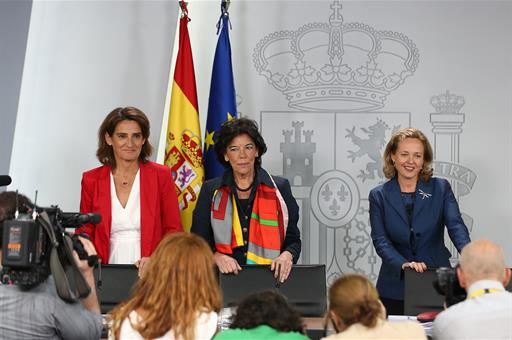Council of Ministers
Government approves urgent measures to reduce electricity bill and boost energy transition
Council of Ministers - 2018.10.5
Moncloa Palace, Madrid
The Council of Ministers approved a Royal Decree-Law to urgently tackle electricity price rises, improve information for consumers, reduce the electricity bill and "speed up the transition to a decarbonised economy through greater integration of renewable energies, fostering sustainable mobility and energy efficiency", explained the Minister for Ecological Transition, Teresa Ribera.
The minister stated that this text is the government's immediate response before the arrival of winter and a preliminary step to the redirection of the country's energy policy, "in which income criteria will take priority in the distribution of the supportive contribution of Spanish society to the most vulnerable groups".
The new legislation includes measures to fight energy poverty that affects 4.6 million Spaniards. To this end, the government has extended the circumstances so that more groups can gain access to the electricity discount, such as single-parent families and grade 2 and 3 dependent persons.
Teresa Ribera announced that the thermal discount will also be created. "We will increase by 15% the beneficiaries of the electricity discount and include certain bans and limitations on cutting off supply during the winter, and we will add the creation of a thermal discount to cover heating needs, which the same people who benefit from the electricity discount will also be entitled to receive".
Consumer protection and end of "sun tax"
The minister highlighted that the sale of the gas and electricity supply through home visits is now banned - the so-called door-to-door system. "We feel that this gives rise to misunderstandings and too much trust by homeowners in signing a new contract".
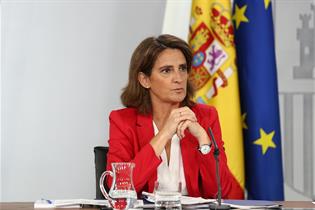 Pool Moncloa/César P SendraTeresa Ribera also pointed out that it will be obligatory to improve information to consumers in such aspects as types of tariff and hourly discrimination. "The bill should stop being a great unknown that arrives on our doorstep each month and that no-one understands the content of".
Pool Moncloa/César P SendraTeresa Ribera also pointed out that it will be obligatory to improve information to consumers in such aspects as types of tariff and hourly discrimination. "The bill should stop being a great unknown that arrives on our doorstep each month and that no-one understands the content of".
Furthermore, the Royal Decree-Law eliminates regulatory barriers that, to date, make the implementation of electricity self-consumption in Spain difficult and not financially attractive, such as the so-called "sun tax". "We believe that one of the measures that can most contribute to the modernisation of our electricity system is to naturally accept that there are a greater number and a wider range of producers and consumers" than previously in the electricity spectrum, argued the minister.
The minister pointed out that a country that has so much sun as Spain only has one thousand low powered installations compared with more than one million in Germany. "We have a long way to go to improve, modernise and incorporate self-consumption into our system".
On another note, Teresa Ribera announced that some bureaucratic red tape will be eliminated to foster the management of electrical recharging points for cars.
Furthermore, the deadline for the entry into force of the 9,000 megawatts of power awarded in the recent renewable energy auctions will be extended until 31 March.
Lower taxation
As a measure in response to the price rise in electricity over recent months, the minister announced that the 7% tax on the value of electricity production and the Special Hydrocarbon Tax for electricity production will be suspended for the next six months, coinciding with the months of highest demand. "We consider that this measure will have an average impact on household consumption of around 4% of the electricity bill".
Teresa Ribera declared that this is "an alleviation measure" while the government works on two main strategies: the National Strategy to Combat Energy Poverty and the Fair Transition Strategy".
Higher growth than in peer countries
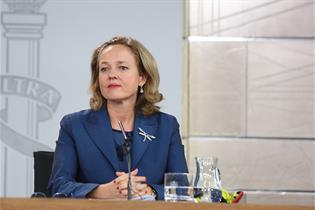 Pool Moncloa/César P SendraThe Minister for the Economy and Business, Nadia Calviño, announced that the government expects the "sound growth" of the Spanish economy to continue this year and the next, which will be reflected in the draft National Budget for 2019.
Pool Moncloa/César P SendraThe Minister for the Economy and Business, Nadia Calviño, announced that the government expects the "sound growth" of the Spanish economy to continue this year and the next, which will be reflected in the draft National Budget for 2019.
Nadia Calviño highlighted that the forecasts made by the main national and international institutions agree that Gross Domestic Product (GDP) in Spain will grow between 2.6 and 2.8% in 2018, and between 2.2 and 2.5% in 2019. "In other words, the Spanish economy will remain strong and is enjoying a positive cyclic phase, with growth that is gradually moderated from the maximum reached in 2015", but which remains at "very high rates and above those of our peer countries", she declared.
The minister recalled that one of these institutions - the International Monetary Fund - pointed out, after visiting its technical staff in Spain this week, that the deficit target on 1.8% of GDP for 2019 is "crucial and appropriate" and that the measures to reduce inequalities are compatible with reducing the fiscal deficit. "In general, there is confidence in the foundations for growth in our country, confidence that is reflected each week in international financial market trends", she said.
Strengths and risks
In terms of the most recent indicators, Nadia Calviño included the tourism stats among the most positive figures: in the first eight months of the year, the number of inbound tourists was practically the same as in 2017 - which was the best year on record - and, moreover, tourist spending was up. These figures, she pointed out, reflect the government's commitment to improving tourism quality, something that boosts both the sector revenue and the sustainability of the model.
The minister also referred to the rise in September in the number of National Insurance contributors and permanent employment contracts, as well as the fall in unemployment in year-on-year terms and the record number of women in work posted this month. The latest figures on retail trade and industrial production were also both positive.
In contrast, she remarked, the performance of exports has declined due to the slow-down in our main markets, although figures still remain in the black. Household consumption and the services sector have also waned and the economic sentiment indicator and consumer confidence have also declined. "But in general, the trends of national and international analysts regarding our economy are not in doubt", stressed Nadia Calviño, who said that the government is "closely monitoring" the risks that exist in our environment, such as energy prices and interest rates, trade and financial tensions and the potential impact of Brexit.
Quality jobs
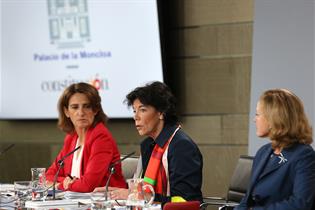 Pool Moncloa/César P SendraThe Minister for Work, Migration and Social Security, Magdalena Valerio, presented the Council of Ministers with a report of the implementation of the Master Plan on Dignified Work 2018-2020, approved on 27 July to combat fraud in temporary employment contracts, reported the Government Spokesperson, Isabel Celaá.
Pool Moncloa/César P SendraThe Minister for Work, Migration and Social Security, Magdalena Valerio, presented the Council of Ministers with a report of the implementation of the Master Plan on Dignified Work 2018-2020, approved on 27 July to combat fraud in temporary employment contracts, reported the Government Spokesperson, Isabel Celaá.
Isabel Celaá described the results of the Plan as "excellent", as 47,025 temporary employment contracts have been converted into permanent employment contracts in August and September. This means that in just two months of action, half of the contract transformations have been achieved that were made in the whole of 2017. Furthermore, 6,451 part-time contracts have seen their working day increased thanks to this action plan, and 12,000 actions have been taken against the figure of the false self-employed.
Isabel Celaá pointed out that this year a public employment offer will be made to recruit 353 new labour inspectors and that, when the Master Plan concludes in 2020, there will be a total of 833.
Demographic challenge
The Council of Ministers allocated 80 million euros to subsidies to local authorities to finance projects for employment, self-employment and group entrepreneurship within the framework of the fight against the demographic challenge in those municipalities with the smallest populations.
The Government Spokesperson specified that these are actions aimed at a very specific segment of young people between the ages of 16 and 30 that are not working or signed up to a training plan. The aim is to foster employability and entrepreneurship so that these people can continue to live in their place of birth.
Other Council of Ministers agreements
- Honorary promotion granted of 85 servicemen and Guardia Civil officers who died in the line of duty and 15 servicemen and Guardia Civil officers retired on grounds of incapacity as a result of active service or for exceptional merit.
- Members of the Board of Trustees of the Cervantes Institute appointed.
- Declaration of emergency to adapt the former military barracks in Motril (Granada) into accommodation for immigrants.
- Authorisation of the call for proposals for subsidies for the sum of 64 million euros.
- Approval of the declaration as a Public Service Obligation of the air routes: Melilla-Almeria, Melilla-Granada and Melilla-Seville.
Catalonia
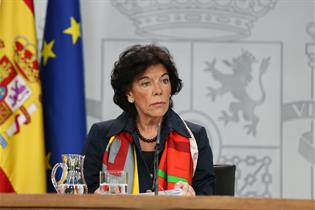 Pool Moncloa/César P SendraThe Government Spokesperson began her press briefing following the Council of Ministers by expressing her concern at the speech by the President of the Regional Government of Catalonia, Quim Torra, and at the suspension of parliamentary activity in Catalonia.
Pool Moncloa/César P SendraThe Government Spokesperson began her press briefing following the Council of Ministers by expressing her concern at the speech by the President of the Regional Government of Catalonia, Quim Torra, and at the suspension of parliamentary activity in Catalonia.
Isabel Celaá underlined that "if the Regional Parliament of Catalonia adopts decisions in breach of the Spanish Constitution, then the Government will act accordingly". She added that the government remains committed to consensus and agreement", and urged Quim Torra to "head up dialogue between Catalans" and the pro-independence leaders so as to "free up institutions so that they can work for the benefit of the people of Catalonia".
Non official translation





